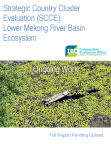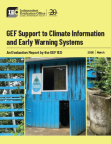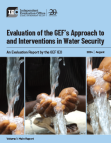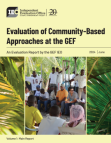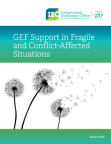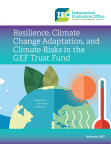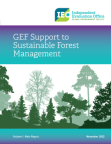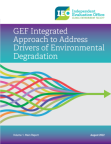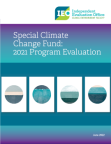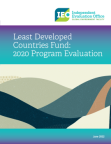This is the first strategic country cluster evaluation(SCCE) in the Lower Mekong River Basin (LMRB) conducted by the IEO to understand the impact of the GEF’s support in addressing the challenges related to land degradation, hydrological connectivity, climate impacts, and biodiversity losses…
Strategic Country Cluster Evaluation (SCCE): Lower Mekong River Basin Ecosystem
Evaluation of GEF Support to Climate Information and Early Warning Systems (CIEWS)
Climate information and early warning systems (CIEWS) are a vital part of reducing vulnerability to the impacts of climate change and building climate change resilience. Climate and weather information dissemination has become synonymous with early warning systems for responding to the hazards…
Evaluation of The GEF's Approach and Interventions in Water Security
Ensuring an adequate supply of clean water for people, livelihoods and ecosystems while also protecting against water-related shocks and stresses are the key components that make up water security. In the GEF, water security is woven into several focal areas, from transboundary water resource…
Evaluation of Community-Based Approaches (CBA) at the GEF
Projects that use community-based approaches (CBA) at the GEF are those that are designed to use a people-centered approach for management of natural resources, characterized by participation of local communities and resource users (including indigenous people, women, youth, and marginalized or…
Evaluation of GEF Support in Fragile and Conflict-Affected Situations
The GEF Independent Evaluation Office is collaborating with the Environmental Law Institute to assess GEF projects and programs in fragile and conflict-affected situations—in short, to determine whether and how GEF interventions are conflict-sensitive, and the implications thereof. This study…
Resilience, Climate Change Adaptation, and Climate Risks in the GEF Trust Fund
Overview
Although the GEF is not focused on climate change adaptation, there has been growing recognition that the effects of climate change impact the GEF's ability to achieve and sustain global environmental benefits. The GEF has addressed these effects in different…
GEF Support to Sustainable Forest Management (SFM)
Overview
The Global Environment Facility (GEF) has supported sustainable forest management (SFM) for almost 30 years, from the GEF Pilot onwards. This is the first comprehensive evaluation of GEF support to SFM, which assesses the outcomes and performance of GEF's diverse…
Formative Evaluation of the GEF Integrated Approach to address the Drivers of Environmental Degradation
The GEF introduced the integrated approach in 2014, building on its long and evolving history on integration. This major reform aimed to address the main drivers of global environmental degradation and deliver multiple benefits across multilateral environmental agreements using the GEF…
Special Climate Change Fund (SCCF): 2021 Program Evaluation
The Special Climate Change Fund (SCCF) was created in 2001 under the United Nations Framework Convention on Climate Change to help vulnerable nations address negative impacts of climate change. The SCCF finances activities that complement those funded by the GEF climate change focal area and by…
Least Developed Countries Fund (LDCF): 2020 Program Evaluation
The 2020 program evaluation of the least developed countries fund (LDCF) covers performance and progress towards LDCF objectives and results in the four years since the 2016 LDCF program evaluation. The main objective of this evaluation is to assess the progress the LDCF has made since the 2016…
